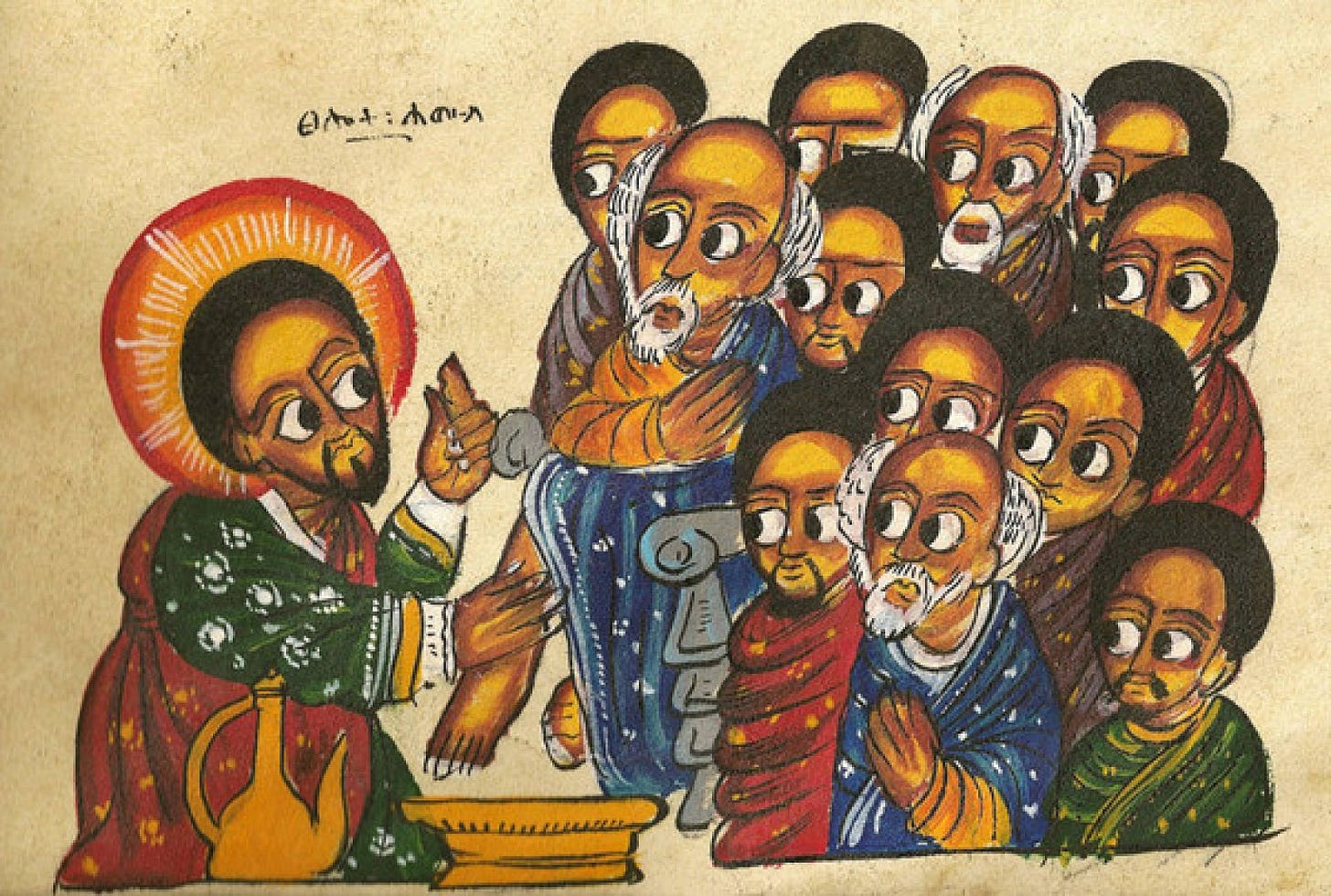Today marks the beginning of the Paschal Triduum, the three most solemn days of the Christian year and the last three days of Lent. For forty days—with some Sunday breaks—the church has been fasting in preparation for Easter. Lent is a long, arduous journey. The ancient Mexica (Aztec) life philosophy envisioned life as a slippery road with ditches on either side, and a life well lived meant that a person paid close attention to the way they lived, the way they walked in the world, so as not to slip off the road of righteousness. It reminds one the narrow road to which Jesus called his disciples.
I don’t know a single person, myself included, who has perfectly kept their Lenten fasts. We all make missteps on this slippery road, we all fall short. And though my desire would be to keep my fast completely from Ash Wednesday to Holy Saturday, isn’t this exactly why Jesus came to us in the first place? The road is too slippery for me, but Jesus is the one who can and did walk the road of life without slipping, and in his incarnation, death, and resurrection, he holds my hand, lifting me out of the mud like he lifted Peter out of the water.
The Triduum typifies in three days the whole of Jesus’ salvific work, and begins with the institutions of two Sacraments that embody that work, beginning with Maundy Thursday.
A New Commandment
On Maundy Thursday, the church remembers the night Jesus washed his disciples’ feet and instituted the Lord’s Supper, the Holy Eucharist. “Maundy” comes from the Latin mandatum, meaning “commandment.” Of this night, John says:
Now before the festival of the Passover, Jesus knew that his hour had come to depart from this world and go to the Father. Having loved his own who were in the world, he loved them to the end. The devil had already put it into the heart of Judas son of Simon Iscariot to betray him. And during supper Jesus, knowing that the Father had given all things into his hands, and that he had come from God and was going to God, got up from the table, took off his outer robe, and tied a towel around himself. Then he poured water into a basin and began to wash the disciples’ feet and to wipe them with the towel that was tied around him. He came to Simon Peter, who said to him, “Lord, are you going to wash my feet?” Jesus answered, “You do not know now what I am doing, but later you will understand.” Peter said to him, “You will never wash my feet.” Jesus answered, “Unless I wash you, you have no share with me.” Simon Peter said to him, “Lord, not my feet only but also my hands and my head!” Jesus said to him, “One who has bathed does not need to wash, except for the feet, but is entirely clean. And you are clean…
John 13:1–10.
John Chrysostom meditates on the humility Jesus demonstrated in this passage. First, Jesus lets everyone sit down to eat; then he gets up; then takes on his robe, i.e. his dinner coat; then wraps a towel around himself; then fills the water basin himself; then washes the feet of his disciples. In all of this, Jesus, their Rabbi, takes a position as their servant.
When Scripture says Jesus loved his disciples “to the end,” the first image of this is not the Cross, even though it is certainly in view, but of the Lord exchanging his nice clothes for a servant’s towel, and instead of expecting someone to serve him dinner, washing dust and dirt and dung from men’s feet. Before giving his disciples his broken body in the form of broken bread, before giving them his poured out blood in a cup of wine, before going to the cross, he washes their feet as a demonstration of his love.
After doing this, Jesus said to them, “I give you a new commandment, that you love one another. Just as I have loved you, you also should love one another” (John 13:34), hence the name, “Maundy Thursday,” or said another way, “Commandment Thursday.” The footwashing was a vivid example of Jesus’ love and humility, his willingness and desire to serve the ones he loved, and it is also the way of life to which Jesus calls us. To be a Christian is not only to receive what Jesus did for us. It is also to give our love and service and lives for the life of the world.
So if I, your Lord and Teacher, have washed your feet, you also ought to wash one another’s feet. For I have set you an example, that you also should do as I have done to you. Very truly, I tell you, servants are not greater than their master, nor are messengers greater than the one who sent them. If you know these things, you are blessed if you do them.
John 13:14–17
On this night, Jesus will gives us the holy Sacrament of his broken body and spilled blood, but he will also wash our feet, bidding us to do the same. I’ve long wondered why footwashing was never considered a Sacrament by the church like Baptism and Communion. Perhaps the servant-life of Jesus still offends us. Perhaps it is still distasteful to us, and to sacramentalize it would be to hold ourselves accountable to it. And yet, we are still called to it. I say this with as much humility as I have, but whether or not the church recognizes footwashing as a Sacrament, it remains so. It would be a good practice if tonight you washed someone’s feet.
On this night, ask yourself a question—Where is God?—and hear the answer, “He is on his knees before his disciples, washing their feet.”




